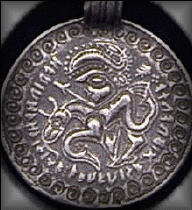
Seeland-II-C
Encyclopedia

Bracteate
A bracteate is a flat, thin, single-sided gold medal worn as jewelry that was produced in Northern Europe predominantly during the Migration Period of the Germanic Iron Age...
from Zealand, Denmark
Denmark
Denmark is a Scandinavian country in Northern Europe. The countries of Denmark and Greenland, as well as the Faroe Islands, constitute the Kingdom of Denmark . It is the southernmost of the Nordic countries, southwest of Sweden and south of Norway, and bordered to the south by Germany. Denmark...
dating to the Migration period
Migration Period
The Migration Period, also called the Barbarian Invasions , was a period of intensified human migration in Europe that occurred from c. 400 to 800 CE. This period marked the transition from Late Antiquity to the Early Middle Ages...
(around 500
500
Year 500 was a leap year starting on Saturday of the Julian calendar. At the time, it was known as the Year of the Consulship of Patricius and Hypatius...
AD). The bracteate bears an Elder Futhark
Elder Futhark
The Elder Futhark is the oldest form of the runic alphabet, used by Germanic tribes for Northwest Germanic and Migration period Germanic dialects of the 2nd to 8th centuries for inscriptions on artifacts such as jewellery, amulets, tools, weapons and runestones...
inscription which reads as:
- hariuha haitika : farauisa : gibu auja : ttt
The final ttt is a triple-stacked Tiwaz rune. This use of the rune is often interpreted as three invocations of the Norse god Tyr.
The central image shows a male's head above a quadruped. This is the defining characteristic of C-bracteates (of which some 400 specimens survive), and is often interpreted as a depiction of Odin
Odin
Odin is a major god in Norse mythology and the ruler of Asgard. Homologous with the Anglo-Saxon "Wōden" and the Old High German "Wotan", the name is descended from Proto-Germanic "*Wodanaz" or "*Wōđanaz"....
healing his horse.
Krause translates the inscription as: "Hariuha I am called: the dangerous knowledgeable one: I give chance." farauisa is interpreted as fara-uisa, either "danger-wise" or "travel-wise". Moltke translates this word as "one who is wise about dangers".
External links
- Kodratoff, Yves. Runic Inscriptions (Transcriptions with interpretations by Krause, Moltke, Antonsen and the author; see Runic Inscriptions from the Second Period no. 81).

